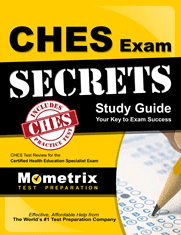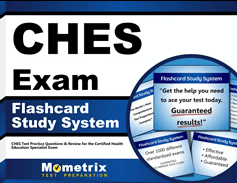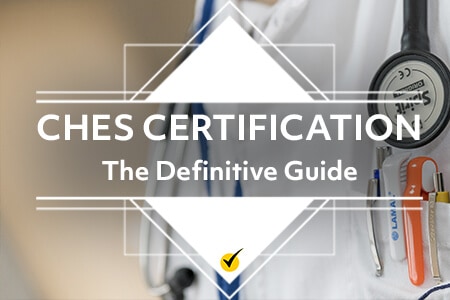I’m sure you’ll agree with me when I say:
Studying for the CHES exam is not easy!
That may be true, but it turns out that there are actually different ways that you can prepare to take the CHES test.
Which is why we’ve put together CHES Certification: The Definitive Guide.

– The pass rate for the CHES Certification exam is about 73%.
– The cost to register for the CHES Certification exam ranges from $240 to $330 for nonstudents depending on when you register for the exam. For those who are students, the fee is $210 to $265 depending on when you register.
A Certified Health Education Specialist teaches behaviors to the general public that promote wellness. Their goal is to develop and implement strategies and goals to improve the health of individuals and their communities. Those who are Certified Health Education Specialists have proven that they have the requirements and ability to provide information on nutrition, exercise, pregnancy, and substance abuse. They also collect data and evaluate health awareness programs such as anti-smoking programs.
Certified Health Education Specialists can work in a variety of settings such as medical practices, educational institutions, senior care facilities, public health departments, and even government agencies like the Center for Disease Control.
Becoming a Certified Health Education Specialist is not only a rewarding career but also a very important career. To become a Certified Health Education Specialist, you will need a bachelor’s degree in health education as well as some experience such as internships and volunteer positions. You’ll also need to pass the CHES Certification exam, and here are a few tips that can help you pass that exam!
1. Understand the Format of the Exam
Part of studying for any exam is to understand the format of the exam. When it comes to preparing for the CHES Certification exam, it’s best that you take the time to look over the actual exam. Taking time to look over the exam will give you more of an understanding as to what you will need to expect such as how many questions are on the exam, the question format (multiple-choice, fill-in-the-blank) and what type of questions will be given.
Here’s what you need to know about the CHES Certification exam:
• There are 165 multiple-choice questions on the CHES Certification exam. 150 are scored while the remaining 15 are pilot tested and not counted towards your score.
• You will be given 3 hours to complete the 165 questions.
• The CHES Certification exam is a competency-based exam.

2. Study Guide
Having a study guide is another thing that will help you prepare for the CHES Certification exam. It’s important to find one that is geared towards helping you focus on details of the CHES exam. You’ll not only be able to dig deeper into the details that you need to know for the CHES exam, but you’ll also be able to brush up on areas of the exam that you may need a little refresher on such as how to properly plan for health education and promotion.
3. Join a CHES Study Group
Chances are that you’re probably taking the CHES Certification exam right after you finish your degree, like many of our classmates. This means that there might be some of your classmates that will be forming study groups to help them prepare for the certification exam. Being part of a study group can help you dig even deeper into the concepts of the exam. You’ll be able to communicate with other students about the exam and ask questions about areas that you may not understand. The National Commission for Health Education Credentialing has a great list of where you can find CHES exam study groups in your state. https://www.nchec.org/ches-study-groups
4. The CHES is a Competency-Based Exam
A competency-based exam measures specific skills that will be needed during your career as a Certified Health Education Specialist. The CHES Certification exam measures your knowledge, application, and possession of the Seven Areas of Responsibility for Health Education Specialists. You’ll be required to rely on information and skills that you already know and have learned while in school.

5. Flashcards
Using flashcards to prepare for the CHES exam can help get down to the details of the concepts that you will be expected to know on the exam. You’ll be able to concentrate on one concept at a time rather than looking at a page filled with different information. Using flashcards will also help you retain information for a longer period of time.
6. Create a Study Plan
You know that once you graduate, or at least get into the last semester of your degree, you’ll be taking the CHES Certification exam. Since the CHES exam is offered only twice a year, you’ll know ahead of time when you’ll be taking it. Take that time before the exam to create a study plan. Try to block out two to three hours each day to focus on one area of the exam at a time. You should also put into your study plan a quick review session of everything that you have studied within the last few days to keep it fresh in your mind.
7. Divide Up the Material
The CHES Certification exam contains 7 areas of responsibility that you will be tested over such as Plan Health Education/Promotion and Administer and Manage Health Education/Promotion. When you’re creating your study plan, make sure that you divide up the material where you learn a different area each day. One day study about the implementation of health education and promotion and the next day study about how to communicate as well as promote and advocate for health education and promotion. This will help you narrow things down and you won’t become so overwhelmed.
8. Practice Test
Taking a practice test can help you understand more about the actual CHES Certification exam. You’ll be given questions with the same formatting and the same type of questions that you will see on the actual exam. You’ll also get a better idea as to what areas of the exam you are weak in and which ones you are strong in. Knowing which areas you need more work in will allow you to add that area to your study plan so you will have more time to practice. It’s also beneficial if you take more than one practice test while you’re preparing for the CHES Certification exam.
CHES Requirements
The eligibility to take the CHES Certification exam relies solely on your academic qualifications. To be eligible to take the CHES Certification exam you must meet these requirements:
- Have a bachelor’s, master’s, or doctoral degree AND an official transcript that shows you have majored in health education.
OR
- Have an official transcript that shows you have at least 25 semester hours or 37 quarter hours of coursework with a grade of “C” or better. You must also have the specific preparation that addresses the Seven Areas of Responsibility and Competency for Health Education Specialists.
If you do not have a degree in health education but are seeking to become CHES Certified, you must meet these requirements:
- Have 25 semester hours or 37 quarter hours of coursework with a grade of “C” or above that focuses on the Seven Areas of Responsibility and Competency for Health Education Specialists.
- Have a minimum of 12 semester hours or 18 quarter hours of those should be from courses that align with the Seven Areas of Responsibility of Health Education Specialists.
- Have a maximum of 9 semester hours or 14 quarter hours may be from courses that include the elements contained in the Seven Areas of Responsibility of Health Education Specialists.
- Have a minimum of 6 semester hours or 8 quarter hours that can be from other courses that include elements in the Seven Areas of Responsibility of Health Education Specialists.
To learn more about the eligibility requirements for the CHES, visit the NCHEC website: https://www.nchec.org/ches-exam-eligibility
CHES FAQ
What is the CHES Certification?
The CHES exam certifies those who want to teach behaviors to the general public that promote wellness. The CHES certification exam is based on Seven Areas of Responsibility which are a set of Competencies that each Certified Health Education Specialist needs to know.
What are the Seven Areas of Responsibility?
The Seven Areas of Responsibility make up the standards of the credential and they include:
• Assess Needs, Resources and Capacity for Health Education/Promotion
• Plan Health Education/Promotion
• Implement Health Education/Promotion
• Conduct Evaluation and Research Related to Health Education/Promotion
• Administer and Manage Health Education/Promotion
• Serve as a Health Education /Promotion Resource Person
• Communicate, Promote and Advocate for Health and the Profession of Health Education/Promotion
When is the CHES exam offered?
The CHES test is offered twice a year; once in April and then again in October. You will need to check the official website for the exact dates.
How do you apply to take the CHES?
To apply to take the CHES exam, you will need to visit NCHEC.org/ches.
How many questions are on the CHES exam?
There are 165 multiple-choice questions on the CHES exam. Out of those 165 questions include 15 pilot tested questions that do not count towards your final score.
How long is the exam?
You are given 3 hours to complete the 165 questions on the exam.
How do you become CHES certified?
To become CHES certified, you will need to have a bachelor’s, master’s or doctoral degree and an official transcript that shows you have at least 25 semester hours with courses that are specific to the Seven Areas of Responsibility.
Is the CHES exam multiple-choice?
Yes. The CHES exam consists of 165 multiple-choice questions.

